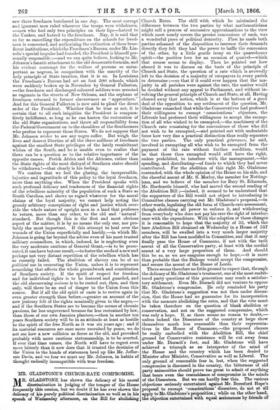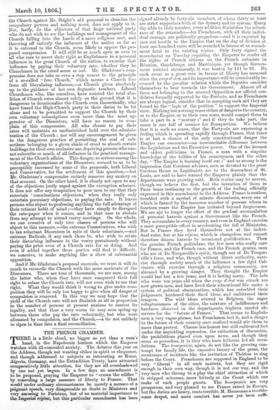`MIL GLADSTONE'S CHURCH-RATE COMPROMISE.
MR. GLADSTONE has shown the delicacy of his moral discrimination in judging of the temper of the House frequently this session, but we doubt if he has ever shown the delicacy of his purely political discrimination so well as in his speech of Wednesday afternoon, on the Bill for abolishing Church Rates. The skill with which he minimized the difference between the two parties by what mathematicians might call a process of successive approximations to the view which most nearly covers the precise concessions of each, was a wonderful piece of political dexterity. First he made both parties ashamed of the disposition to increase their demands directly they felt they had the power to baffle the concession of the other, by a little gentle irony on the quarrelsome spirit—the positive love for an occasion of quarrel—which that course seems to display. Then he pointed out how absurd it was to discuss on the basis of the principle of Church and State, the question of a rate which is avowedly left to the decision of a majority of ratepayers in every parish to determine ;—so that if it could ever happen that the ma- jority in all parishes were against the rate, the matter would be decided without any appeal to Parliament, and without in- volving the general principle of Church and State, at all. Having cleared away that notion, which is at the bottom of a good deal of the opposition to any settlement of the question, Mr. Gladstone remarked that while the Conservatives had professed their willingness to exempt conscientious ' objectors, the Liberals had professed their willingness to accept the exemp- tion of all who wished to be exempted,—the machinery of the Church rate remaining for the convenience of those who did not wish to be exempted,—and pointed out with undeniable force how very fine a practical distinction thus really separates. the two parties. The only practical grievance, he said, involved in exempting all who wish to be exempted from the payment of the rate without further condition, would be that those thus exempted would still have the right, unless prohibited, to interfere with the management,—the- spending, and distributing—of funds to which they had never - contributed. For the abolition of this right Mr. Gladstone contended, with the whole opinion of the House on his side, and the cheerful assent of Mr. S. Morley, the member for Notting- ham, and we believe of the member for Bury St. Edmunds, Mr. Hardcastle himself, who had moved the second reading of the Abolition Bill ;—indeed, it seemed to be understood that the supporters of the Bill would not object to introducing in. Committee clauses carrying out Mr. Gladstone's proposal,—in other words, legalizing the old form of Church-rate assessment, though abolishing all power to enforce it, and withdrawing from everybody who does not pay his rate the right of interfer- ence with the expenditure. With the adoption of these changes- it is reasonable to hope that the majority of 33, which the. bare Abolition Bill obtained on Wednesday in a House of 537 members, will be swelled into a very much larger majority after the Bill has been modified in Committee, and that it may finally pass the House of Commons, if not with the tacit assent of all the Conservative party, at least with the cordial assent of a very large proportion of them. And should this be so, as we are sanguine enough to hope,—it is more than probable that the Bishops would accept the compromise, and secure the assent of the House of Lords.
There seems therefore no little ground to expect that, through the delicacy of Mr. Gladstone's treatment, one of the most embit- tered party questions of this generation may reach a satisfac- tory settlement. Even Mr. Disraeli did not venture to oppose Mx. Gladstone's compromise. He only reminded his party that Mr. Gladstone's suggestion was not then under discus- sion, that the House had no guarantee for its incorporation with the measure abolishing the rates, and that the vote must be taken therefore on the question of blank abolition or conservation, and not on the suggested compromise, which- was only a hope. If, as there seems no reason to doubt,-- unless indeed the Dissenters of the country at large show themselves much less reasonable than their representa- tives in the House of Commons,—the proposed clauses. be really embodied with the Abolition Bill, the chief: ground for Conservative resistance will be cut away from. under Mr. Disraeli's feet, and Mr. Gladstone will have achieved a triumph as an interpreter of the mind of the House and the country which has been denied to Minister after Minister, Conservative as well as Liberal. The only ground of reasonable fear is, lest, when the suggested compromise is discussed in the country, the bitterness of old party animosities should prove too great to admit of anything that bears even the resemblance of compromise in the minds of the Dissenters. But we can hardly fear this. The various objections seriously entertained against Mr. Beresford Hope's proposal to exempt conscientious ' dissenters, do not at all apply to Mr. Gladstone's proposition ; while on the other hand, the objection entertained with equal seriousness by friends of the Church against Mr. Bright's old proposal to abandon the compulsory powers and nothing more, does not apply to it. Nor, lastly, do the objectors of that large national party who do not wish to see the buildings and management of the Church falling into the hands of a mere religious sect, and throwing off entirely the influence of the nation so far as it is external to the Church, seem likely to oppose the pro- posed compromise. It will still be as much open as ever to all who care to assert their right as Englishmen to a personal influence in the great Church of the nation, to exercise that influence by paying their voluntary rate, whether they be Churchmen in the creed sense or not. Mr. Gladstone's com- promise does not take us even a step nearer to the principle of a so-called " free Church," which means a Church free from all liberalizing influence,—a Church given absolutely up to the guidance of her own dogmatic teachers. Liberal Churchmen who, like ourselves, have resisted the total abo- lition of Church rates almost solely on the ground that it is dangerous to denationalize the Church even theoretically, who have feared the High-Church party in their desire to be let alone and to be permitted to support the Church by their own voluntary subscriptions even more than the most ag- gressive of the Dissenters, will have no reason to com- plain of this compromise. All who choose to pay their rates will maintain an undiminished hold over the adminis- tration of the Church ; nor will any encouragement be given to the dangerous practice of permitting the zeal of sub- scribers belonging to a given shade of creed to absorb certain buildings for their own exclusive use, depriving persons who can- not subscribe so much, of all influence in the practical manage- ment of the Church affairs. This danger, so serious among the voluntary organizations of the Dissenters, seemed to us to be perceptibly increased by some of the proposals, both Liberal and Conservative, for the settlement of this question,—but Mr. Gladstone's compromise entirely removes any anxiety on that account. On the other hand, it is clearly not open to any of the objections justly urged against the exemption schemes. It does not offer any temptation to poor men to say that they entertain conscientious objections,' when they really only entertain pecuniary objections, to paying the rate. It leaves persons who object to professing anything the full advantage of their reticent habit of mind ;—they have simply to disregard the rate-paper when it comes, and in that case to abstain from any attempt to attend vestry meetings. On the whole, we can conceive of only two classes of persons who will object to this measure,—the extreme Conservatives, who wish to tax reluctant Dissenters in spite of their reluctance,—and extreme Radicals, if any such there be, who wish to retain their disturbing influence in the vestry gratuitously without paying the price even of a Church rate for so doing. And even if added together these parties will find it difficult, we conceive, to make anything like a show of substantial opposition.
And if Mr. Gladstone's proposal succeeds, we trust it will do much to reconcile the Church with the more moderate of the Dissenters. There are tens of thousands, we are sure, among .the latter who, when they have once conquered their full right to refuse the Church rate, will not even wish to use that right. What they would think it wrong to give under com- pulsion they will be only too happy to give when all danger of compulsion is removed. In this way we may hope that the yield of the Church rate will not diminish at all in proportion to the number of persons at present anxious to contest its legality, and that thus a very warm tie may soon spring up between those who pay the rate voluntarily, but who were alienated by compulsion, and the Church,—a tie not unlikely to ripen in time into a final reconciliation.































 Previous page
Previous page